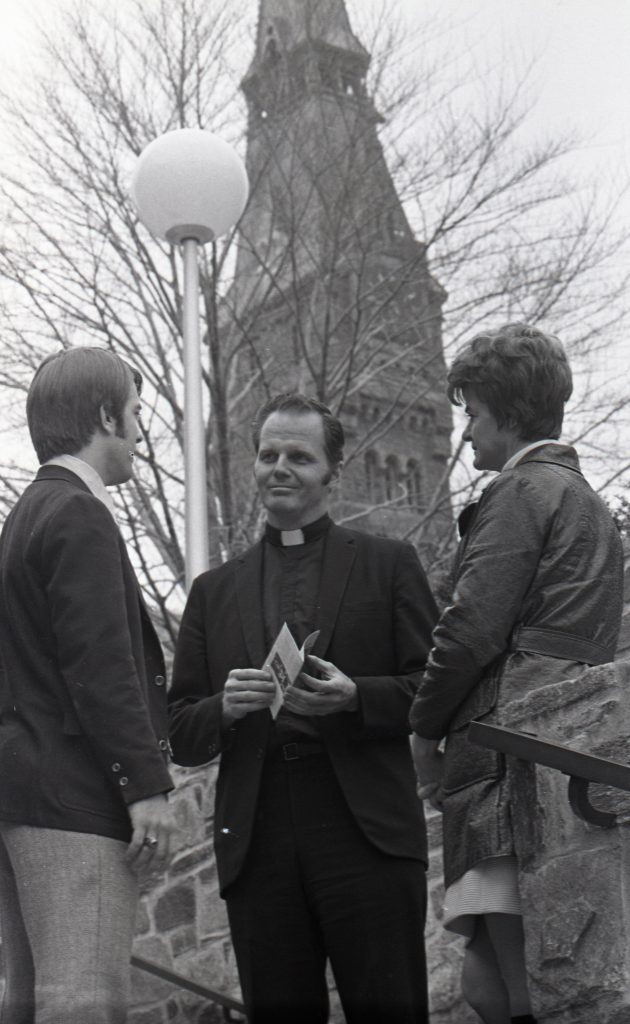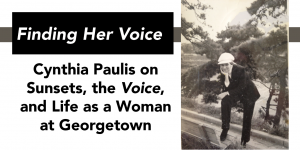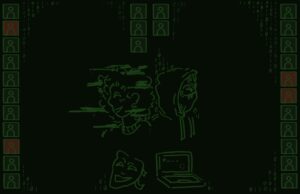Former Georgetown professor and longtime human rights advocate Rev. Charles Currie, S.J. passed away on Jan. 4 in D.C. after a brief illness. He was 88. Georgetown honored Currie with a wake and vigil on Jan. 11, and those who knew him celebrated his dedication to higher education and social justice.
In an interview with the Voice, Rev. Gregory Schenden, S.J., director of campus ministry, praised Currie for his faith.
“When we talk about the love of God, this isn’t just some nice, cute theory for Charlie,” Schenden said. “It was the reality.”
Born in Philadelphia, Pa., in 1930, Currie began attending Fordham University in 1948, but left the school in 1950 to join the Society of Jesus. He received bachelor’s and master’s degrees from Boston College in 1955 and 1956 before going on to secure a P.h.D. in physical chemistry from the Catholic University of America in 1961. On June 16, 1963, Currie was ordained as a priest at Woodstock Theological Seminary in Woodstock, Md.

Fr. Currie during his time at Georgetown
Currie joined Georgetown’s Jesuit community in 1966, when he came to the university as an assistant chemistry professor. He was a faculty member in residence in a student dorm for all six years he taught at Georgetown, and from 1969 to 1972 he served on the school’s Community Scholars Committee. At the Jan. 11 vigil held in Wolfington Hall, Rev. Bernie McIlhenny, S.J., who vacationed in New Jersey with Currie for 40 years, described Currie as passionate about higher education.
“He had a deep conviction about the power of educating,” McIlhenny said in his eulogy. “He was a leader, and he was always thinking ahead.”
Currie quickly became a national leader in Jesuit education, becoming the president of Wheeling Jesuit University in Wheeling, W.Va., in 1972, and serving there for a decade before taking a position as the president of Xavier University in Cincinnati, Ohio, in 1982.
In 1986, Currie returned to direct Georgetown’s bicentennial celebration, but he found another cause while he was at the university. Currie was asked by then-president Rev. Timothy Healy, S.J. to coordinate Georgetown’s response to the murder of six Jesuit priests, their housekeeper, and her daughter, on Nov. 16, 1989, in their home at the University of Central America in San Salvador, El Salvador. His friends and family say this began both his lifelong interest in human rights issues in central America and his friendship with U.S. Rep. Jim McGovern (D-MA), who worked as a Congressional aide at the time. In an interview with the Voice, McGovern said that Currie was determined to uncover what had happened to the slain priests.
“He was an extraordinary human being,” McGovern said. “He reached out to me to say, ‘Look, I want to be helpful…We need to get to the truth.’ From that moment on, we were close friends.”
Investigators eventually discovered that all victims were killed by members of El Salvador’s U.S.-backed military because they had publicly opposed the nation’s brutal, 12 year-long civil war. McGovern said that Currie was deeply disturbed by the United States’ involvement in the war, and spent the rest of his life advocating for peace in the area.
“He was a fierce defender of human rights. He was just tireless,” McGovern said. “Speaking as a U.S. Congressman, I think he represented the best of our country. There are a lot of people who have a high opinion of our country because of Fr. Currie.”
In a Jan. 5 statement, Speaker of the House Nancy Pelosi lauded Currie’s work in higher education and social justice.
“Father Currie believed deeply in the power of education to transform lives, and dedicated his life to educating and mentoring the next generation,” the statement read. “Father Currie’s advocacy for equal opportunities and economic justice earned him deep love and respect of all.”
After the Congressional investigation into the massacre had been completed, Currie continued to travel between Washington and Central America, making his final journey to El Salvador in 2017. He remained involved with higher education, and he was elected president of the Association of Jesuit Colleges and Universities (AJCU) in 1997, a role he held for more than a decade before stepping down in 2011.
He used his role with the AJCU to bring justice for the murdered Jesuits back to the United States, working closely with former Jesuit Bob Holstein to organize the Ignatian Family Teach-In for Justice, an annual event around the anniversary of the massacre that brought college students together to participate in a vigil and speak with Jesuits about the efforts for justice in Central America.
The Teach-In grew and eventually led to the Ignatian Solidarity Network (ISN), a lay organization that uses Jesuit teachings to educate the public on human rights, environmental, and criminal justice issues. According to Chris Kerr, executive director of ISN, the teach-in is now the largest Catholic social justice conference in America, and it takes place in D.C., where high school and college students can meet with members of Congress to discuss ISN’s core aims.
McGovern celebrated Currie’s lifelong commitment to El Salvador, acknowledging that while most people involved with the investigation of the massacre moved on to other issues, Currie remained invested in El Salvador. He hopes that Currie’s legacy will inspire action from those who knew him.
“I hope he’s remembered not just with fond and nice thoughts…I hope that we all work harder for justice,” McGovern said. “Charlie’s life was about action, and for those of us who loved him, we’re called to action. For my part, I’m going back to El Salvador.”
Julia Pinney contributed to this report.





